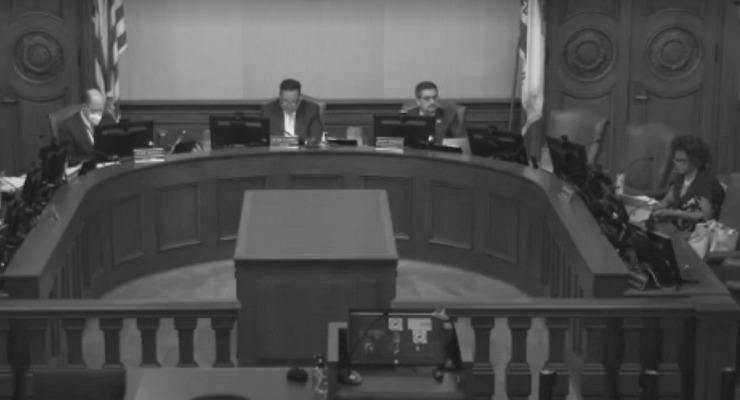 At the ACT candidates forum on January 10, all City Council candidates were asked if they supported a “just-cause eviction ordinance.” We heard Fifth District Councilmember Victor Gordo, whose official City biography emphasizes his high school athletic accomplishments, swung for the fences by saying that the just-cause-eviction ordinance was “the rent control question” – but he struck out because just-cause eviction has nothing to do with rent control. Councilmember Gordo followed up his strike-out by espousing a rejected legal theory to oppose a just-cause-eviction ordinance. At the candidates’ forum on Affordable Housing sponsored by All Saints Episcopal Church on January 31, Councilmember Gordo repeated his opposition to a just-cause eviction ordinance; in answering the just-cause-eviction question, he once again referred to rent control.
At the ACT candidates forum on January 10, all City Council candidates were asked if they supported a “just-cause eviction ordinance.” We heard Fifth District Councilmember Victor Gordo, whose official City biography emphasizes his high school athletic accomplishments, swung for the fences by saying that the just-cause-eviction ordinance was “the rent control question” – but he struck out because just-cause eviction has nothing to do with rent control. Councilmember Gordo followed up his strike-out by espousing a rejected legal theory to oppose a just-cause-eviction ordinance. At the candidates’ forum on Affordable Housing sponsored by All Saints Episcopal Church on January 31, Councilmember Gordo repeated his opposition to a just-cause eviction ordinance; in answering the just-cause-eviction question, he once again referred to rent control.
Surprisingly, Mr. Gordo’s opposition to a just-cause-eviction ordinance uses the same legal theory – the Lochner doctrine – that was used to support opposition to child labor laws, the 40 hour workweek, and other reforms during the early 1900s Progressive-era and New Deal period. This legal theory has rarely been heard since the U.S. Supreme Court rejected it in the midst of the New Deal.
We’ve never heard a purportedly progressive labor lawyer like Victor Gordo advocate such an anti-progressive position.
A just-cause eviction ordinance has nothing to do with rent control
A just-cause-eviction ordinance prohibits landlords from evicting tenants for arbitrary or capricious reasons. It shifts the burden to landlords to establish that their attempts to evict tenants are based on good causes. Pasadena’s neighbor Glendale is a city with a just-cause-eviction ordinance. To review it, go to:
or just Google “Glendale just cause eviction.” The Glendale just-cause-eviction ordinance has the following rationale for regulating tenant evictions:
…[T]here is an increasing demand for rental housing in the city of Glendale which has resulted in a critically low vacancy factor. In addition, an increasing number of residential rental housing units have substandard living conditions and reduced services. Tenants who have complained about substandard living conditions and/or a reduction in services have been threatened with eviction, and oftentimes have been evicted. Other tenants are fearful of eviction and, as a result, fail to complain about substandard living conditions. This circumstance is disruptive to a stable living environment and has a detrimental effect on the substantial numbers of renters in the city, particularly senior citizens, those with low or moderate incomes and persons on fixed incomes.
Just-cause-eviction ordinances add to other regulation preventing landlords from wrongfully evicting tenants – such as the California Civil Code that prohibits retaliatory evictions for tenant complaints about unsafe housing conditions and the California Fair Employment and Housing Act that prohibits racial, gender, sexual preference, religious and other suspect-category housing discrimination. In contrast, rent control generally restricts the amount and/or frequency of rent increases that landlords can impose on their tenants. The State Legislature has effectively eliminated rent control in California by severely limiting the kinds of restrictions that cities can impose on landlords’ rent increases; the limited restrictions that can be imposed are generally called rent-stabilization ordinances.
Why would Victor Gordo refer to just-cause eviction as “rent control question”?
For an attorney running as a 4-term incumbent, Mr. Gordo displays an apparent ignorance about landlord regulation by equating just-cause-eviction with rent control. The two have nothing to do with each other except that both regulate landlords and the Apartment Owners Association hates both – sort of like calling child labor and minimum wage laws the same thing because the National Association of Manufacturers hated both. In the minds of reactionaries who oppose any restrictions on them that benefit the less powerful, all regulation is the same – they don’t distinguish between just-cause-eviction ordinances and rent control ordinances. Legislators whose minds aren’t controlled by their pocketbooks – or whose decisions aren’t based upon the paranoid fears of landlords – can see the differences.
In the absence of any better explanation, we surmise that Councilmember Gordo is spending more time talking to apartment owners than District 5 apartment dwellers. Perhaps Councilmember Gordo is calculating that he’ll get more donations from real estate interests than from the working class apartment residents of District 5 by appeals to landlords about his opposition to “rent control.” But the explanation may be as simple as the fact that Councilmember Gordo is a landlord himself, as he owns two Pasadena rental properties; perhaps he wants to retain his right as a landlord to evict tenants for arbitrary or capricious reasons.
Lochner law – what every labor lawyer like Gordo knows
Councilmember Gordo is not just a lawyer but a labor lawyer; he represents union members against employers. A lawyer doing such admirable work representing the underdogs in our society surely has to be aware of Lochner vs. New York, the 3rd most-reviled U.S. Supreme Court decision in history (the two most reviled being the Dred Scott decision supporting the property rights of slave-holders in anti-slavery states and Plessy v. Ferguson legitimizing “separate but equal” segregation). The 1905 Lochner case struck down a New York maximum work-week law that prohibited more labor than 60 hours per week.
Lochner’s “substantive due process” doctrine relied upon by the Dred Scott decision handed down 48 years earlier. Oliver Wendell Holmes, perhaps our greatest Supreme Court Justice, wrote a stirring dissent in Lochner, but the majority decision in Lochner became the precedent for 32 years as a reactionary Supreme Court repeatedly used it to strike down minimum wage, child labor, and workplace safety laws and other progressive reforms that restricted the contract rights of the wealthy.
The U.S. Constitution prohibition against government taking life, liberty, or property without due process of law has usually been seen as a guarantee of fair procedures necessary for government to imprison or execute persons or to take away property from them. Lochner’s substantative due process interpretation read into this process-oriented clause a substantive limitation against any taking away of property rights; under Lochner it didn’t matter whether the process was fair, the government simply couldn’t restrict contract rights. Lochner held that the employer’s property right to freely contract with workers was violated by any government restriction. The Lochner doctrine protected the wealthy – employers and property owners – by giving them the freedom to contract without government regulation. With their economic power, employers and wealthy property owners could put in their contracts provisions allowing discrimination, retaliation, the right to evict for arbitrary or capricious reason, etc. If the Supreme Court had not in 1937 overruled Lochner, California could not have enacted its Fair Employment and Housing Act that prohibits racial, gender, age and other forms of discrimination in housing. California could not have enacted the Civil Code provision prohibiting retaliatory evictions for reporting unsafe housing conditions. If Lochner were still the law, Pasadena could not enact a just-cause-eviction ordinance; fortunately, Lochner is no longer the law.
Gordo’s reliance on outdated racist law that became anti-labor law
So how did Councilmember, labor lawyer, and landlord Victor Gordo explain at the ACT candidates forum his answer “No” to the question of whether he supported a just-cause-eviction ordinance? We remember hearing a several minute lecture on how landlords’ right to contract with their tenants should not be infringed by a just-cause-eviction ordinance. We don’t know whether Councilmember Gordo was at the top, bottom, or middle of his law school class. But he seems to have learned well the rationale of Lochner as his argument he expressed on January 10 to attack a just-cause-eviction ordinance seems like it came right out of Lochner. When we went to law school, our law school professors taught us that Lochner was lethal to progressive regulation designed to protect the less wealthy in our society; maybe Councilmember Gordo missed class the day of that lecture.
Skip Hickambottom and Dale Gronemeier are Pasadena-area attorneys; the majority of their practice is representing employees against employers.














 0 comments
0 comments


